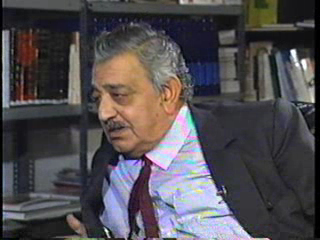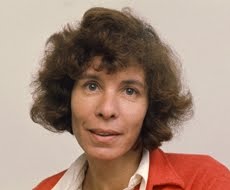 Winner and looser: in the middle Mahmoud Abbas (Abu Mazen) who was unanimously elected as leader. To th right Ahmed Qurei (Abu Alaa) who lost his seat on the Central Committee.
Winner and looser: in the middle Mahmoud Abbas (Abu Mazen) who was unanimously elected as leader. To th right Ahmed Qurei (Abu Alaa) who lost his seat on the Central Committee.It is with some amazement that I have read the many positive descriptions that western observers gave of the recent Fatah Congres that from the 4th August on was held in Bethlehem.
Almost generally it was called a 'new start', the 'old guard' made way for 'new faces', Fatah came out 'stronger' and would now be more able to deal with Hamas and to continue with the peace process.
I must say that I don't share that kind of optimism. I have waited a few days to think it over (the luxury of a blogger who does not have to deal with deadlines anymore) but in the end I am really convinced that Fatah, once the strongest factor in Palestinian politics has been weakened considerably, maybe even to the point that it is going to split in various splinters or vanish altogether. And worse yet: there is even room for the suspicion that one faction is taking over Fatah, a faction that is no less undemocratic than the regimes in Egypt or Jordan and that is prepared to make a deal with Israel on terms that fall short of an independent, viable state.
Why do I think so?
There are various reasons. First of all: this was the first Fatah congress since 1989. That last time Arafat was still around, and so were several other historic leaders, like Abu Iyad (Salah Khalaf) and Khaled al Hassan (although the Israeli's had succeeded in murdering Abu Jihad (Khalil al Wazzir) earlier that year). Fatah was more or less in a winning mood: Israel seemed to have lost its upper hand because of the first intifada.
Now, 20 years on, the difference is huge. The great leaders are no more, the Oslo agreements of 1993 brought many changes but not a state an certainly no improvement of the conditions of living, the hopes of 1989 have faded. An endless 'peace process' that never brought any results, has undermined the credibility - and even legitimacy - of Fatah to the point that it lost the elections in 2006 to Hamas. And during all those years Fatah was so divided about the strategy it ought to follow, that it never succeeded in convening a congress.
But things all of a sudden changed this year. How come? What happened? The journalist Bilal al-Hassan, a younger brother of the Fatah-leaders Hani and Khaled al-Hassan but himself not a member of Fatah, gave a damning picture in As Sharq al-Awsat of 19 July (partly translated by Toufic Haddad here). Al-Hassan described how the preparatory committee was quarreling about the place of the venue - inside or outside the occupied territories, Amman or Bethlehem, with many in favour of an outside congres - and how Abu Mazen then unilaterally disbanded the committee, summoned a number of Fatah-cadres from the Westbank to his office in Ramallah and then en there decided that the place of venue would be Bethlehem, which documents would be discussed and which number of Fatah-members would be invited as delegates. Abu Mazen's move, says Al-Hassan, had of course huge consequences for who would attend. Opponents of the peace proces would either not be welcome, because Israel wouldn't let them in, or would be dependent on a one time laisser passer, for which Abu Mazen had to apply to the Israeli government. In this way the Palestinian president had a decisive say in who would attend and what would be discussed. Al-Hassan did not hesitate to call it 'a coup within Fatah'.
That was one thing. And yes, Abu Mazen's move caused a split. Farouq Qaddoumi (photo), the last of the historical leaders although one who has always been operating at the sidelines,
 revived an old story and told a press conference in Amman that Abu Mazen together with Mohammed Dahlan had plotted with Ariel Sharon in order to poison Arafat. Also Mohammed Jihad, a fierce opponent of holding the meeting in Bethlehem who in the end appeared not to have been invited, anounced the birth of a new Fatah: Fatah Awakening. What will come from it remains to be seen.
revived an old story and told a press conference in Amman that Abu Mazen together with Mohammed Dahlan had plotted with Ariel Sharon in order to poison Arafat. Also Mohammed Jihad, a fierce opponent of holding the meeting in Bethlehem who in the end appeared not to have been invited, anounced the birth of a new Fatah: Fatah Awakening. What will come from it remains to be seen. But more important: the week long conference itself was characterized by a total lack of political reports. There were no clarifications of mistakes in the past, no analyses of why the peace process had failed sofar, nor why Hamas beat Fatah at the elections. There was not even a clear cut strategy for the future. When asked by the delegates to clarify the absence of any of such papers, Abu Mazen suggested that his long (46 pages) and rather dull opening speech should be considered as such. It seems rather questionable that this lack of even the slightest traces of the revolutionary spirit from the past that used to be Fatah's hallmark, can convince the Westbank people in the streets that the movement has been 'revitalized' and is an attractive party to cast their votes for in any elections if there ever would be one.
Next on the program in Bethlehem was the selection of the 23 strong Central Council, 18 of them by direct vote, the rest by appointment by the leader. First the leader himself, Abu Mazen, was appointed by acclamation. No surprises there. But for the rest there were some: Old hands from Arafats time, like Intissar al Wazir (widow of Abu Jihad), Nasser Youssef, Hakam Balawi, Hani al-Hassan (and Farouq Qaddoumi for that matter) lost their places at the CC. And the same happened to Ahmed Qurei (Abu Alaa), erstwhile prime-minister and chief negotiater with the Israelis.
Marwan Barghouti, down left: Jibril Rajoub, down right: Mohamed Dahlan.
In their place people like Jibril Rajoub, Mohammed Dahlan, Tawfiq al-Tirawi and Hussein al-Sheikh were elected, all of them connected with the security apparatus of the Palestinian Authority: Rajoub was the former security chief on the Westbank, Dahlan his collegue in Gaza (he was responsible for the American sponsored attempt in 2007 to overthrow Hamas which backfired and caused Fatah to be kicked out of Gaza). Al-Sheikh and Tirawi have been high ranking offcials in the intelligence apparatus. All of them have connections with the 'overhaul' of the security apparatus and the civil service of the PA, which is being executed under supervision of the Americans (and in cooperation with the Israeli's). (Read my earlier article about general Dayton, here). All of them are against a reconcliation with Hamas. So are some other newly elected CC-members,like Azzam al-Ahmad, the head of Fatah's faction in parliament, or Tayeb Abdel Rahim, Abu Mazens bureau chief (who at the very last minute was added to the list of newly elected CC-mmbers after a dubious recount of the votes). Some people would argue that the election of the very popular younger Westbank leader Marwan Barghouti, who is stongly in favour of reconciliation, will serve as a counterweight. But that remains to be seen. Barghouti's position looks rather isolated among the rest of the CC, also literally: he's serving six life sentences in an Israeli jail.
 Security forces in the new 'Dayton-style' as seen here provided the right atmosphere during the conference in Bethlehem.
Security forces in the new 'Dayton-style' as seen here provided the right atmosphere during the conference in Bethlehem.The voting for the CC was strongly criticised from two sides. The 11-man strong Fatah-leadership of Gaza resigned collectively because they did not get enough people on the CC and called the voting procedure unfair (Gaza got only Nabil Shaath and Mohamed Dahlan on the CC). The Gazans had been handicapped from the beginning, because Hamas did not let them go. The 400 man strong delegation did not get permission to leave, said Hamas, because Fatah refused to free the plm. 460 Hamas sympathizers in Palestinian jails in the Westbank. Consequntly the Gazans had to cast their votes per telephone.
The other criticism came from Ahmed Qurei, who told the paper Al-Quds al-Arabi that the way the voting had been handled was worse than it had been in Iran, with several people voting more than once and general confusion about procedures. According to him the results had been pre-cooked. He hinted that this might have something to do with what only a few insiders knew: 'The current stage is hard and difficult and there were offers for a temporary state and a solution without the Right of Return and without Jerusalem and it seems there were people in the Palestinian arena who were ready to accept those offers,' he said. Also he put a big question mark on the election of four PA security leaders known for their coordination with the Israeli occupation to the Central Committee. 'Did this happen accidentally?' Qurei added that he had been against holding a conference in Palestine under occupation, but had nevertheless, after it so had been decided, tried to make the best of it. But one group had 'turned things upside down, because it wanted something against the will of the majority. Ít seems they ware searching for Yes-men'.
And then, at last, at the closing of the conference, did the tiger show some of its former teeth? Did the renewed Fatah demand an end to the closure of Gaza, an investigation into the conduct of the Israeli army during the operation Cast Lead? An end to the checkpoints, the freeing of the prisoners? Nothing of the kind. The political program calls for a continuation of the peace process, although not before Israel calls a building freeze. It reiterated that Fatah wants a state within the pre- 1967 borders, with East-Jerusalem as its capital, and it repeats the right of return and the right of armed resistance to the occupation. Words, words, words. The question is: how many people will be convinced?
 The new Fatah-leadership prays at the tombe of Yasser Arafat at the end of the Fatah conference. Would Abu Amar have been pleased with the results?
The new Fatah-leadership prays at the tombe of Yasser Arafat at the end of the Fatah conference. Would Abu Amar have been pleased with the results?

.jpg)




